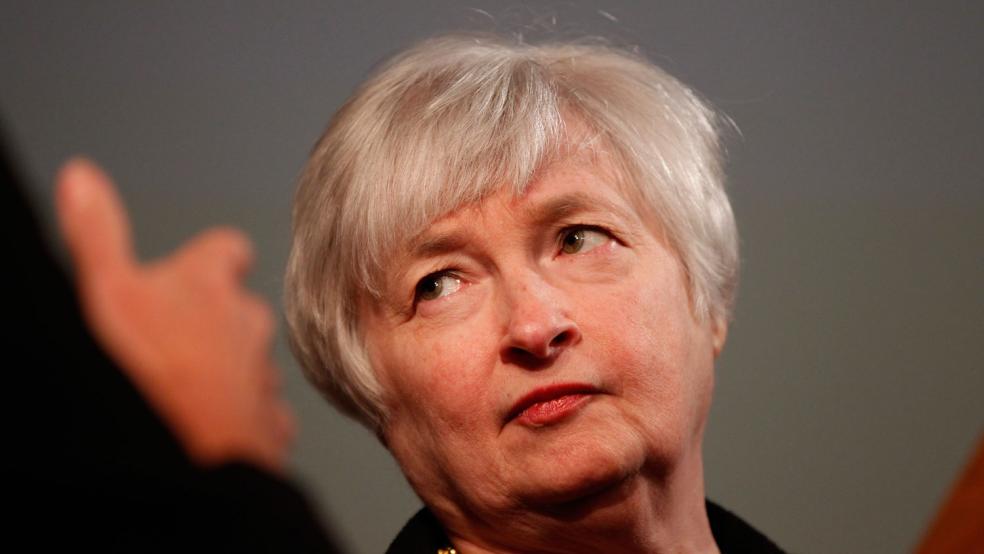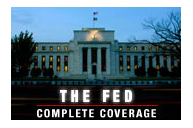Janet Yellen is slated to become the first chairwoman of the Federal Reserve at a precarious moment for the central bank, offering stability at a time of crippling uncertainty in Washington.
President Obama nominated Yellen, currently the Fed vice-chairwoman, to succeed Ben Bernanke on Wednesday afternoon. The 67 year-old—a Brooklyn native and Yale University-trained economist—has been a chief advocate for using extraordinary measures at the Fed in recent years to lower the unemployment rate.
"She is a proven leader, and she’s tough, not just because she’s from Brooklyn,” Obama said. “Janet is renowned for her good judgment. She sounded the alarm early about the housing bubble … and she calls it like she sees it....American workers will have a champion in Janet Yellen.”
"While we have made progress, we have farther to go," Yellen said of the economy. "Too many Americans still cannot find a job and worry about how they'll pay their bills and provide for their families."
Yellen emphasized that Fed staff have responded to economic problems with "expertise and objectivity," a revealing statement as congressmen with little knowledge of the financial markets pontificate about the impact of a possible government default. Her job is to be the data-driven wonk with a sensitivity to the human lives that often get lost in statistics and rhetoric.
Yellen faces two key obstacles going forward: 1.) Getting confirmed in highly charged partisan environment, and 2.) Figuring out when to throttle back the $85 billion in monthly bond purchases that the Fed has relied on to stimulate hiring.
Her skilled reading of the sluggish recovery has won her support among Senate Democrats, including a group that opposed Obama’s initial frontrunner for the top spot at the Fed, former Treasury secretary Larry Summers.
The Fed had looked to lower the rate of monthly purchases as the unemployment rate fell to 7 percent, but it shocked the economy last month by deciding to hold steady on its buying. The unemployment rate had fallen to 7.3 percent in August, but largely because of a workforce exodus. And Fed officials expressed concern at the time about a budgetary showdown that has since resulted in the partial closure of the government for the past eight days.
RELATED: BUDGET BRAWL COULD SIDESWIPE FED PLANS TO TAPER
The bond buying program known as QE3—shorthand for the third round of quantitative easing that Yellen helped shepherd--has also earned her critics among the GOP, who argue that it will eventually spark rampant inflation.
“The next Fed Chair faces a unique set of challenges, including winding down unconventional monetary policy, implementing a long list of unfinished rules under Dodd-Frank without over-regulating the community banking sector, and effectively communicating future policies to the markets and the public,” said Sen. Mike Crapo of Idaho, the ranking Republican on the Banking Committee. “I continue to strongly disagree with the Fed’s use of quantitative easing.”
The inflation predicted by Republican critics, however, has yet to materialize. Since August of last year, prices have increased by just 1.5 percent, according to the Bureau of Labor Statistics. That’s well below the Fed’s 2 percent target.
To gain confirmation, Yellen will likely need 60 votes to bypass a potential Republican filibuster. This means that at least six GOP senators must join with Democrats in her support before the final vote can be decided by a simple majority.
Brian Gardner, head of Washington research for the bank Keefe, Bruyette & Woods, believes that some Republicans will join with Democrats to back Yellen.
“Given that she is not a highly polarizing figure and is not seen as a partisan, not to mention the gender politics of her being the first woman nominated to lead the Fed, we doubt she will be blocked by Republicans,” he said in an analysis.
RELATED: HERE’S WHY A KEY OBAMA ALLY BACKS YELLEN FOR FED CHAIR
Her fate could also rest with whether conservative groups such as Club for Growth decide to make the cloture vote part of their political scorecard. The group uses this scorecard to decide whether to challenge incumbents in Republican primaries.
In 2011, the club made the nomination of MIT economist Peter Diamond to the Fed board one of its scorecard votes—and Diamond eventually withdrew from consideration. The club has yet to take a stand on Yellen’s candidacy.
“We haven’t decided yet and don’t expect to do so soon,” said spokesman Barney Keller.
STABILITY AT A TIME OF UNCERTAINTY
What Yellen does offer is a rare source of stability during a period of tremendous upheaval in Washington with the shutdown and possible debt ceiling breach occurring later this month.
The Fed has been the primary source of economic stimulus while Congress has remained gridlocked for the better part of two years, a role that has both driven the stock market upward while bloating the central bank’s balance sheet to unprecedented levels.
Yellen would be “a force for continuity in Fed policies,” said JPMorgan Chase economist Michael Feroli in a client note. “Indeed, many of the policy innovations over recent years, such as the economic and interest rates forecasts and the statement of longer-run goals and policy strategy, were advocated by Yellen. She was the least likely of all the chairperson candidates to rock the boat.”
She served on the Fed board of governors from 1994 to 1997, followed by a six-year stint beginning in 2004 as the president of the Fed’s regional San Francisco bank. Obama named her as the Fed vice-chairwoman in 2010.
No other Fed chairperson arrived with that same depth of experience, particularly when the institution has been running on emergency mode since the financial meltdown in 2008.
But Yellen will need to decide when the economy has recovered enough so that QE3 can be unwound, a feat that would be hard to do if the Fed’s leading indicator—the unemployment rate—is unavailable due to the government shutdown.
Bernanke—in his final meeting with Fed officials—at the end of this year or the start of next year could begin to lower the rate of purchases. Otherwise, the choice will likely fall to a freshly-confirmed Yellen. Some economists expect her to pull back on QE3 to prove her bona fides. But if the past few months have taught anything, the choice will be about the data and the economy improving, not the individual calling the shots.
“Getting the macro right is hard enough without all these second order considerations,” Feroli said. “If payrolls are humming along by then, the decision would likely be made in January, if not, then it would come later.”





